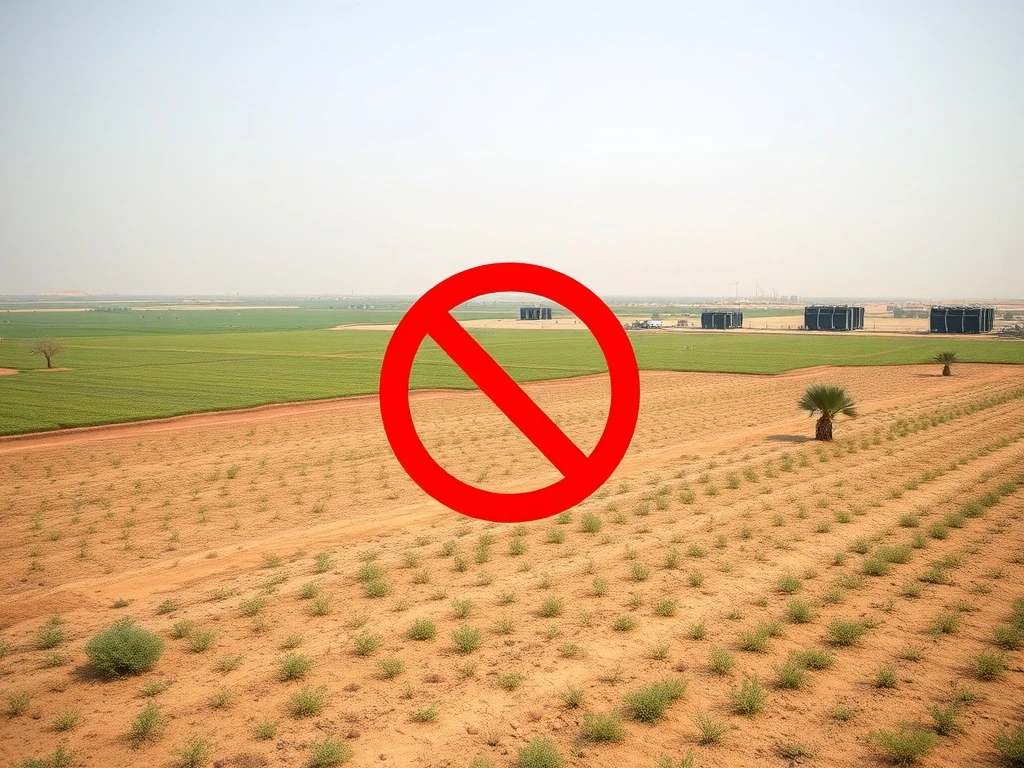Abu Dhabi Crypto Mining Ban: Urgent Restrictions on Farmland Spark Debate

The emirate of Abu Dhabi has taken a significant step, directly impacting the cryptocurrency sector. Recently, its agricultural regulator announced an urgent ban on using farmland for crypto mining activities. This move highlights a growing global trend where authorities grapple with the energy demands and land use implications of digital asset operations. For cryptocurrency enthusiasts and industry players, understanding these new restrictions and their broader context is crucial. This decisive action from the UAE, a hub for innovation, sets a notable precedent for UAE crypto regulation.
Abu Dhabi Crypto Mining Ban on Farmland Takes Effect
The Abu Dhabi Agriculture and Food Safety Authority (ADAFSA) issued a direct ban. This authority oversees agricultural practices within the emirate. They specifically prohibited the use of agricultural land for crypto mining. Consequently, violators face a substantial 100,000 AED fine, approximately $27,229. The ADAFSA will also suspend municipal services. Furthermore, they will confiscate mining hardware. Lastly, they will disconnect the farmland from the electrical grid. This comprehensive enforcement strategy became effective following Tuesday’s announcement.
ADAFSA emphasized that farmland must serve agricultural purposes only. This condition applies to qualify for government services, subsidies, and utilities. Therefore, the authority clearly stated that crypto mining activities conflict with regional sustainability policies. Such operations undermine existing land use provisions. They confirmed, “Such activities fall outside the scope of permitted economic uses defined by the authority and are not allowed on farmlands.” This stance reinforces the emirate’s commitment to preserving agricultural resources.
Understanding the Regulatory Stance and Its Implications
The regulator’s decision is rooted in a clear policy framework. It aims to ensure land resources are used efficiently. The Abu Dhabi crypto mining ban directly addresses concerns about resource allocation. Agricultural land is designated for food production. Using it for energy-intensive mining diverts it from its primary purpose. This policy also supports food security initiatives in the region. The move underscores a careful approach to land management within the UAE.
Moreover, the ban reflects a broader concern about energy consumption. Crypto mining demands significant energy input. This often contributes to spikes in energy generation. Regulators worldwide scrutinize this impact. Abu Dhabi’s action aligns with global efforts to manage energy resources responsibly. The government seeks to balance technological advancement with environmental stewardship. This demonstrates a proactive stance on emerging industry challenges.
The Broader Debate: Crypto Mining Environmental Impact
The environmental impact of crypto mining remains a contentious global issue. Critics argue that mining operations negatively affect ecology. They point to high energy consumption and carbon footprints. Conversely, advocates highlight innovations within the industry. They often cite vertically integrated mining operations. These operations aim to recycle runoff energy. They can also siphon waste into useful utilities. This debate continues to shape regulatory responses worldwide.
For example, Bitcoin mining energy use has drawn particular attention. Researchers have explored ways to mitigate its environmental footprint. Some studies suggest that crypto mining can actually aid environmental efforts. Miners continuously seek the cheapest energy sources. This is because crypto mining is a highly competitive business. Narrow profit margins encourage efficiency. Consequently, many miners turn to renewable forms of energy. These include hydroelectric and geothermal power. They also utilize runoff energy from industrial processes.
Innovative Solutions for Sustainable Crypto Mining
Renewable energy sources power over 50% of Bitcoin mining in 2023. This includes practices like flaring excess energy from gas fields. It also involves siphoning methane energy from waste. These methods turn otherwise wasted energy into productive power. Such approaches demonstrate a path towards more sustainable operations. The industry actively seeks solutions to reduce its ecological footprint.
Recent research further supports these innovative uses. In August 2024, a paper titled “An integrated landfill gas-to-energy and Bitcoin mining framework” was published. It outlined how Proof-of-Work (PoW) mining can convert methane energy into usable power. The researchers examined landfill-gas-to-energy (LFGTE) systems. These systems siphon methane gases from garbage in landfills. They then convert this gas into electricity. This process sequesters harmful greenhouse gases. It prevents them from entering the atmosphere. This innovative approach offers a dual benefit: waste reduction and energy generation.
These findings align with earlier studies. The 2023 paper “Bitcoin and the Energy Transition: From Risk to Opportunity” suggested similar benefits. It argued that mining could potentially reduce global emissions by up to 8% by 2030. Despite this, critics persist in highlighting mining’s ecological risks. US lawmakers, for instance, have repeatedly attempted to involve the US Environmental Protection Agency (EPA). They seek regulations to restrict mining activity. These proposed regulations include provisions to reduce air and water pollution. They also target greenhouse gas emissions under existing US laws. Newer regulations also aim to address noise pollution from mining facilities.
Global Regulatory Landscape and UAE Crypto Regulation
The UAE crypto regulation environment continues to evolve. Abu Dhabi’s recent ban reflects a global trend. Jurisdictions worldwide are actively shaping their stances on cryptocurrency operations. Governments aim to balance innovation with environmental and economic responsibilities. This creates a complex landscape for miners and investors alike. Clear regulatory frameworks are becoming increasingly important.
The move in Abu Dhabi mirrors discussions happening in other major economies. For instance, in the United States, debates about mining’s impact are ongoing. Lawmakers explore various regulatory tools. These include environmental protections and energy efficiency standards. Such efforts highlight a collective global concern. The need for responsible development within the crypto space is paramount. This ban serves as a reminder of the increasing scrutiny faced by the industry.
Implications for Future Crypto Mining Operations
This farmland crypto mining prohibition has significant implications. It sends a clear message to potential miners. Land use policies are a serious consideration for regulators. Miners must evaluate locations based on more than just cheap energy. They must also consider local zoning and environmental regulations. This could lead to a shift in where mining operations are established. Areas with clear, supportive regulatory frameworks will likely become more attractive.
Furthermore, the ban could spur greater innovation in sustainable mining practices. Companies might invest more in renewable energy solutions. They could also explore off-grid locations. These locations might utilize waste energy sources. The industry’s ability to adapt will be key. Demonstrating environmental responsibility can help mitigate future regulatory challenges. The Abu Dhabi decision underscores the growing importance of sustainable operations in the crypto sector.
In conclusion, Abu Dhabi’s ban on crypto mining on agricultural land marks a critical development. It emphasizes the increasing regulatory focus on the crypto mining environmental impact and responsible land use. While the crypto industry continues to innovate with sustainable solutions, regulators globally are setting clearer boundaries. This ongoing dialogue between technological advancement and environmental stewardship will undoubtedly shape the future of cryptocurrency mining.









